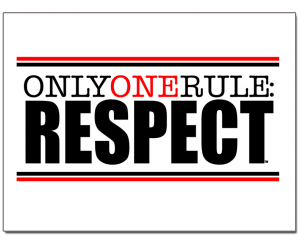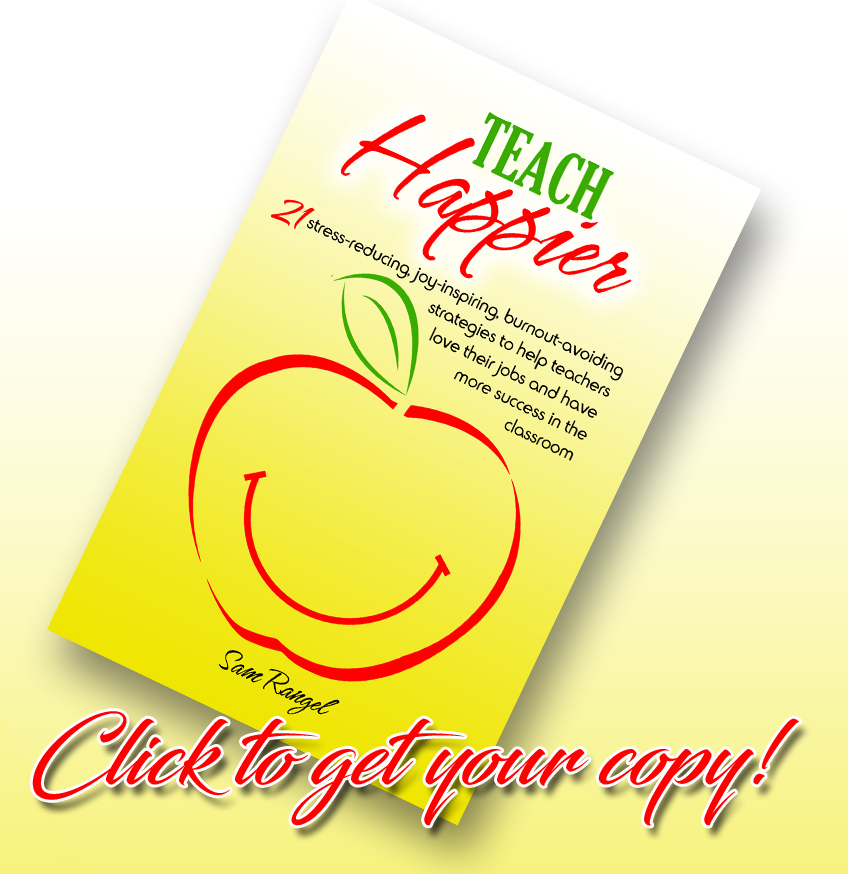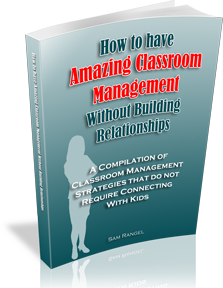This is the second part of the Only One Rule: Respect Series. If you haven’t read the first part, you can find it here.
In the Only One Rule classroom, it’s important to remember that respect goes both ways.
This is kind of difficult for some teachers to agree on.
Technically, teachers are not required to respect their students.
They can say mean words to a student and not get in trouble. Students, however, can get in big trouble if they say mean words to a teacher.
Unfortunately, I’ve known some of these disrespectful teachers. They fail to see how respect goes both ways, and then they don’t understand how a student doesn’t connect with the class or why a student is often off task, disruptive, or even defiant.
Amazing teachers understand that the Only One Rule idea applies to them as well.
Teachers who demonstrate respect to their students – ALL their students – even the disrespectful ones – have much more success in the classroom.
I have had students sent to me for being disrespectful to the teacher in class. As an administrator, I’m the one who has to hand out the consequences to a student for his/her poor behavior in class.
In many instances, the student reacted inappropriately, because the teacher, knowingly or not, disrespected him/her first.
Maybe the teacher humiliated the student in front of the class with a snide remark.
Maybe in an attempt to be sarcastic or funny, the teachers embarrassed him.
Maybe the teacher became frustrated and started yelling at the class.
The Only One Rule needs to be a policy that both students and teacher agree to.
This again can be a great conversation on that first day.
It can go a long way to build a positive relationship with the class.
Imagine the conversation:
Teacher: “It’s important that you understand that the Respect rule is not just for you. It’s for me too. I’m committed to respecting you as well. What does that look like?”
Students: (Silence)
Teacher: “How would you feel if I got here just when the bell rang, and gave you a boring worksheet to do while I tried to figure out what we’re going to do that day?”
Students: “Disrespected”
Teacher: “Your right. You come to class ready to learn something and have a meaningful day of instruction. Your education is important and valuable, and I need to respect that.”
Students: (Heads nodding)
Teacher: “What if I want to be funny, and I start making fun of your hairstyle or what you’re wearing? I won’t get in trouble, because I’m the teacher, but would that be following our Respect rule?”
Students: “No.”
Teacher: “I want you to promise me something. Since I’m going to be reminding you of our respect rule when you break it, I want you to remind me when you notice that I’m breaking the respect rule as well.”
Students: (Gasps)
Teacher: “You won’t get in trouble. I promise to apologize for not being respectful, and we’ll move on. Can you do this for me?”
Imagine how powerful this conversation will be.
I know what you’re thinking, “Sam, isn’t pointing out when the teacher is wrong showing disrespect to that teacher? Won’t that undermine the teacher’s authority?”
My answer is, “Yes, but…”
Yes, the teacher can see it as an attack on his/her authority, but he/she could also use it to teach a very powerful lesson to the kids. It all depends on how a teacher decides to react.
This is so hard to do, especially in a moment when you’re already frustrated about something.
For example, you get frustrated because Johnny walked into your class late again.
You say in front of the class, “Johnny, you’re late again. I’m going to call your parents. This has got to stop.”
Johnny doesn’t say anything, and just goes to his seat.
Suddenly, one of your more smart-aleck students says, “Mrs. Jones, you broke the respect rule. You disrespected Johnny.”
Some kids chuckle. Others say, “Ohhhhh.”
(You know they will.)
What do you do?
Do you try and justify your actions, by explaining that Johnny disrespected you and the class by coming in late?
Do you get mad at the smart-aleck?
Do you ignore it?
Do you scold the class?
Or do you use this as a powerful learning lesson?
“You’re right. I did break the respect rule. I should not have embarrassed you in front of the class, Johnny. I am sorry.”
Making a statement like this will be tough. It will take all the self-control you can muster to not begin trying to justify your actions.
For some teachers, unfortunately, it will be impossible, but amazing teachers will recognize this as an opportunity to strengthen the relationship with the class. Amazing teachers will see it as a moment to teach an even greater lesson – a world-changing lesson – knowing how to admit your wrong and how to apologize.
Imagine if some adults knew how to do this?
Like I said in the first part of this series, the classroom is the place where are future leaders are being developed. Imagine if some of our current world leaders knew how to admit they are wrong and apologize?
Most students, as you know, will try and defend their actions when they’re called out on a mistake they’ve made. Many times they end up making things worse by arguing with the teacher.
Learning how to calmly accept that a mistake was made is a great lesson that they will remember the rest of their lives.
Learning how to apologize is another great lesson that can help save that student from conflicts in the future.
The Only One Rule: Respect idea is not only for the students.
Amazing teachers know that respect goes both ways.
Don’t forget to download your free Only One Rule: Respect poster.
You can find it at: www.onlyonerulerespect.com.
Please follow me on Facebook or Twitter to be notified when the next part in this series is posted.
Until then, here’s to your Success in the Classroom!
Thanks,
Sam
P.S. I just published a new ebook: The Amazing Teacher Pledge – 10 Promises that Amazing Teachers Make and Keep Every Day.
You can download it from Amazon Kindle here.
Thanks again,
Sam



